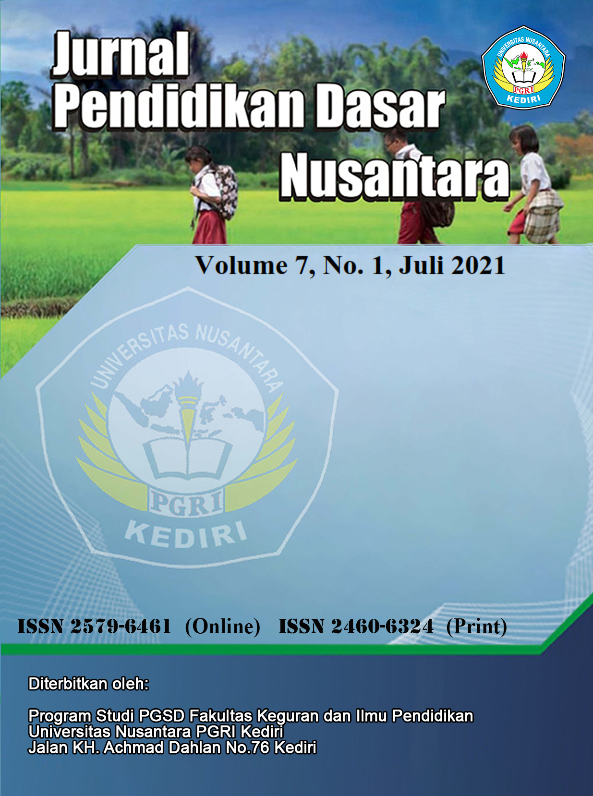Implementasi Pembelajaran Dalam Masa Pandemi Covid-19 Pada Guru Sekolah Dasar
DOI:
https://doi.org/10.29407/jpdn.v7i1.16082Keywords:
Implementation, Learning, OnlineAbstract
The purpose of this study was to determine the implementation of online learning during the pandemic in spiritual, affective and psychomotor aspects. The type of research used in this study is a qualitative research, with a descriptive design. The data obtained by the researcher is data in the form of primary and secondary data with data collection techniques in the form of interviews and observations to 6 public and private elementary school teachers who are divided into low grade and high grade teachers in Rembang, Pati, Purwodadi, Sragen, and Madya Districts. Surakarta. The data analysis techniques used are 1) Data collection, 2) Data reduction, 3) Data presentation, and 4) Conclusions, the validity of the data using triangulation methods with research results as follows: 1) Implementation of online learning in the spiritual realm based on the results of the above interview can it can be concluded that the achievement of online learning in the spiritual realm runs optimally, 2) the implementation of online learning in the realm of attitudes based on the results of the interview above, it can be concluded that the achievement of online learning in the realm of attitudes runs optimally, and 3) the implementation of online learning in the realm of skills based on the results of interviews can it can be concluded that the achievement of online learning in the realm of skills received by students has maximum results. It can be concluded that the implementation of learning during the COVID-19 pandemic for elementary school teachers with maximum achievements.
Downloads
References
Agarwal, H., & Pandey, G. N. (2012) Impact of e-learning in Education. International Journal.
Aji, R. H. S. (2020). Dampak COVID-19 pada pendidikan di indonesia: Sekolah, keterampilan, dan proses pembelajaran. Salam: Jurnal Sosial dan Budaya Syar-i.(7), 5, 395-402.
Arifin, Z. (2012). Evaluasi Pembelajaran : Prinsip Teknik Prosedur. Bandung: Remaja Rosdakarya.
Barnawi & Arifin, M. (2012). Etika dan profesi kependidikan. Jogjakarta: Ar-Ruzz Media.
Gikas, J.,& Grant, M. M. (2013). Mobile computing device in higher education: Student perspectives on learning with cellphones, smartphones & social media. Internet and Higher Education, 19, 18-26.
Ilmiyah, S. (2020). Surotul Ilmiyah - PBNU Menjawab Tantangan Virus Corona. Dipetik April 18, 2020, dari YouTube alobatnic: https://youtu.be/SPdc4WT8BCg.
Jethro, O. O., Grace, A. M., & Thomas, A. K. (2012). E-learning and its effects on teaching and learning in a global age. International Journal of Academic Research in Business and Social Sciences, 203-210.
Juliana, D. Dewi, K. Siti. (2019). “Pengenalan Cerita Rakyat dan Game Edukasi Untuk Anak Menggunakan Android”. Jurnal Ilmiah Informatika Vol. 14(2): Hal. 103-110.
Kusmiran, E. (2015). Soft skills caring dalam pelayanan keperawatan. Jakarta: Trans Info Media.
Khusniyah, L. N, Hakim, L. (2019). Efektivitas Pembelajaran Berbasis Daring: Sebuah Bukti pada Pembelajaran Bahasa Inggris. Jurnal Tatsqif, 17(1), 19-33.
Menteri Pendidikan. (2020). Surat Edaran Nomor 3 Tahun 2020 Tentang Pelaksanaan Pendidikan dalam Masa Darurat Corona Virus (COVID-19).
Moleong, L. (2012). Metodologi Penelitian Kualitatif. Bandung: PT. Remaja Rosdakarya.
Rosali, E. S. (2020). Aktifitas Pembelajaran daring pada masa pandemi covid-19 di jurusan pendidikan geografi universitas siliwangi Tasikmalaya. Geosee, 1(1).
Sobron, A.N, Bayu, Rani, Meidawati,S. (2019). Persepsi Siswa dalam Studi Pengaruh Daring Learning Terhadap Minat Belajar IPA. SCAFFOLDING: Jurnal Pendidikan Islam dan Multikulturalisme Vol. 1, No. 2, hh. 30-38.
Sudjana, N. (2009). Penilaian Hasil Proses Belajar Mengajar. Bandung: PT. Remaja Rosdakarya.
Sudrajat, J. (2020). Kompetensi Guru Di Masa Pandemi Covid-19. Jurnal Riset Ekonomi dan Bisnis, 13(1), 100-110.
Sugiyono. (2018). Metode Penelitian Manajemen. Bandung: Alfabeta.
Suwandi, S. (2010). Model assesmen dalam pembelajaran. Surakarta: Yuma Pustaka.
Winarni, Z. (2018). Apa, Mengapa, dan Bagaimana. Prosiding Semnas Pendidikan IPA Pascasarjana UM. 1(1): 976-98.
Yuangga, K. D., & Sunarsi, D. (2020). Pengembangan media dan strategi pembelajaran untuk mengatasi permasalahan pembelajaran jarak jauh di pandemi covid-19. JGK (Jurnal Guru Kita), 4(3), 51-58.
Downloads
Published
Issue
Section
License
Authors who publish with this journal agree to the following terms:
- Copyright on any article is retained by the author(s).
- The author grants the journal, the right of first publication with the work simultaneously licensed under a Creative Commons Attribution License that allows others to share the work with an acknowledgment of the work’s authorship and initial publication in this journal.
- Authors are able to enter into separate, additional contractual arrangements for the non-exclusive distribution of the journal’s published version of the work (e.g., post it to an institutional repository or publish it in a book), with an acknowledgment of its initial publication in this journal.
- Authors are permitted and encouraged to post their work online (e.g., in institutional repositories or on their website) prior to and during the submission process, as it can lead to productive exchanges, as well as earlier and greater citation of published work.
- The article and any associated published material is distributed under the Creative Commons Attribution-ShareAlike 4.0 International License

































